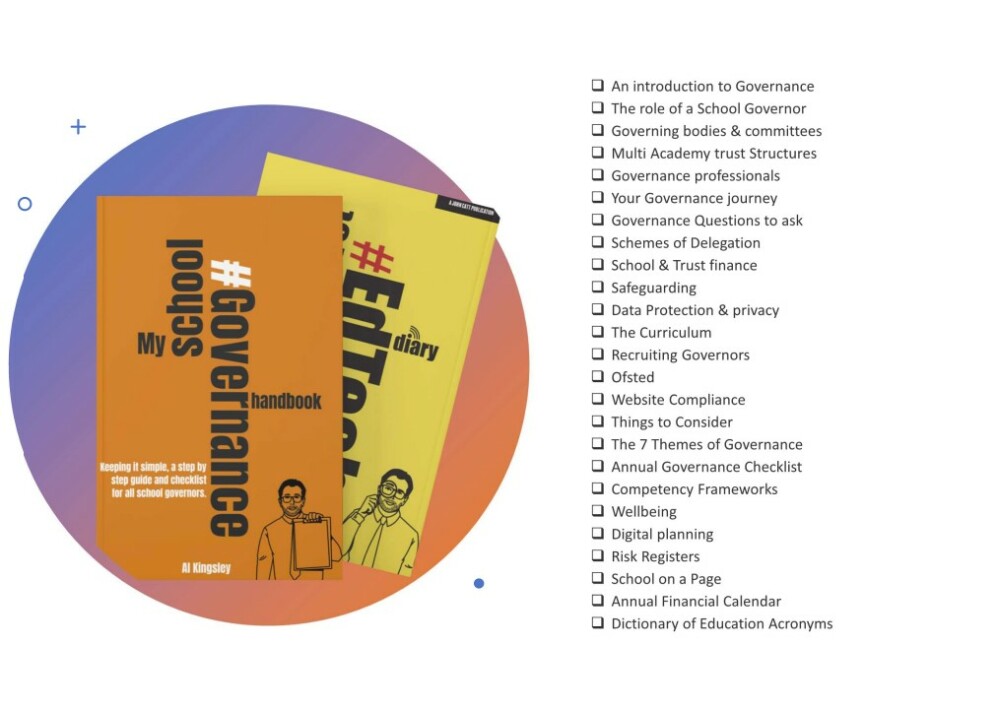New! A handy guide to school governance

You don’t find many books about school governance
.... so when we heard about a new guide that’s been written to support governors and trustees we wanted to find out more.

The author is Al Kingsley - a hugely experienced multi-academy trust chair - and his book, ‘My School Governance Handbook’ is out on 10 October. It’s written in the kind of conversational tone that feels like a friend explaining a new concept over a coffee.
We caught up with Al to find out a bit more about what he’s hoping to achieve with the book and who will benefit from reading it.
Al, where did the idea for a book about school governance come from?
Last year I had the experience of taking a topic that’s also pretty complicated - technology - and turning it into an accessible read for people working in schools. The experience helped me to recognise the value of the ‘say it simple’ approach.
I’m also a MAT chair and one of our biggest challenges is trying to attract and support people from different walks of life and industries. Many people don’t understand governance and think it’s not for them, which is something we need to change.
There’s also an ever-changing landscape in education, including what’s expected of governors and trustees. It’s really hard, with a busy life, to stay up-to-date. So, having found a formula that seemed to work for a book about ed tech, I thought I’d apply that to my other passion which is school governance.
How much did you know about school governance when you first got involved?
I thought I had a pretty good grip on what schools do about having provided technology solutions to schools for several years but this turned out to be pretty naive. You enter governance on a learning journey about what your role is.
Over the years I’ve learned that it’s fine to ask ‘why’ and that people aren’t offended if you provide a challenge as it gives them an opportunity to explain the rationale behind their plans and decisions. I wish I’d asked more ‘whys’ in the early stages.
The book is written in a very easy-to-read way which is helpful as governance can get complex.
It’s an irony isn’t it that we’ve taken loads of big terms in education, turned them into acronyms to make them easier to work with and in doing so we’ve made the system more complicated and less accessible for anybody that doesn’t come from an education background!
I’d argue it’s incumbent, not just on governors to ask if they don’t know something, but also on senior leaders to explain acronyms and set out why certain information is relevant or important.This should encourage greater conversation which is what we’re actually trying to foster.
I hope what I’ve achieved in the book is a sense that lots of governance isn’t unique to education, it’s just about the kinds of robust challenges we have in many other settings.
How long do you think it takes before a governor can be effective?
It depends on how well they’re supported. I’d say I probably wasn’t contributing as much as I could for the first couple of years. But on the other hand, sometimes the most value a new governor has is asking ‘why’ when they’re looking at things with a fresh pair of eyes.
Sometimes we do things because we’ve always done them but they don’t stand the test of time and are worthy of challenge. The best way to get value out of a new governor in their first meeting is for the chair and school leader to foster an environment where people can ask what they might be tempted to preface with ‘I know it’s a silly question but’..
... because often the silly questions are useful. They’re ones we often take for granted and never bother revisiting.
Have you seen that in practice?
Absolutely - throughout my journey as chair of local governing bodies and now chair of a MAT I’ve found that the sooner you foster an environment where people feel able to ask any question, no matter what it is - the sooner you get a more reflective practice and healthy discussion.
It’s also really important that new and existing governors come prepared. On many occasions, when I’ve been asked to support local governing bodies or MATs which are failing, I’ve seen board meetings where reports are presented that have been shared a week in advance and they’re simply read out verbatim to trustees and no-one asks any questions. What is the point of that exercise? The board clearly hasn’t engaged with the report. Even if it’s, ‘that bit of information is really positive’ or ‘that’s a great shift since last year, well done’. The board must also breed reassurance and confidence by evidencing that they’ve engaged with the reports and the data. The worst thing for any member of staff is to write a report and nobody asks a question about it.
If we ask the big questions - why, what’s the purpose, have we considered? Firstly it gives our senior leaders a chance to reflect on their decisions, but we’re also crafting a paper trail and evidence in our minutes to demonstrate that those conversations have been had.
In the book you explain how to prepare for a first ever governor meeting. I realised how ill-prepared I was for my first ever governor meeting
You and me both! In this part of the book I also highlight the role of the clerk or governance professional. Many a new chair of governors has learnt quickly the value of their clerk or governance professional and embraced their support.
I didn't fully appreciate the role at the beginning but I am absolutely spoiled now as we have an amazing governance professional in our trust who provides excellent support, which is necessary if a board is to be truly effective.
I refer to them in the book as the ‘glue’ in governance. When talking about governance, it would be really easy to talk simply about governors, trustees and leaders and neglect the role of the clerk or governance professional. Yet none of the other bits would work without the role, so it’s important that respect and recognition is part of the conversation.
The role of a governance professional is also significantly more complicated than it was 10 years ago in terms of accountability, particularly in MATs.
How do you feel about the diversity problem we have in governance? So few boards represent society, let alone their local communities.
We should want our governing bodies to be reflective of our communities. All skills and experiences can bring benefits.
I’m a firm believer that education is for everyone, not only for ‘certain people’ with ‘certain experiences’. Some of the most amazing governors I’ve come across have no background in education and come with a very different set of approaches. When I think about multi-academy trusts, applying a business assessment to the amount of risk versus return in some of the decisions we take is important.
So who’s this book for? New governors? Existing governors?
Obviously from a marketing perspective it’s for all adults over the age of 18! But seriously, I absolutely wanted to make it something that would give a new governor a sense of confidence.
I hope schools and trusts consider using it as part of their governor induction. As for more experienced governors I hope some will see value in it and others find confirmation they’re doing all of the right things already. Even experienced governors are always trying to find checklists and reminders, so I’d like to think there’s something in there for everybody.
It might also help would-be governors find out more about what it involves before taking it on. I hope people will have a look and I’d love to get your feedback.
Finally, why are you still in governance after all these years?
My passion is education and learning opportunities. Those who know me will also know that as well as mainstream and alternative provision, I chair the regional SEND board, I’m an apprenticeship ambassador and I chair the employment and skills board for our county. I believe we’re lifelong learners and everyone should have equal chances. For me, governance and effective schools are what unlocks equity at the start of children’s learning journeys. If I didn’t have to pay the bills, I’d probably do it full time as it’s the thing I do get the most pleasure from.
Follow Al Kingsley for news, views and updates
On Twitter: @AlKingsley_Edu, Facebook: @AlkingsleyEdu, LinkedIn: @alkingsley1



Post your comment
Comments
No one has commented on this page yet.
RSS feed for comments on this page | RSS feed for all comments